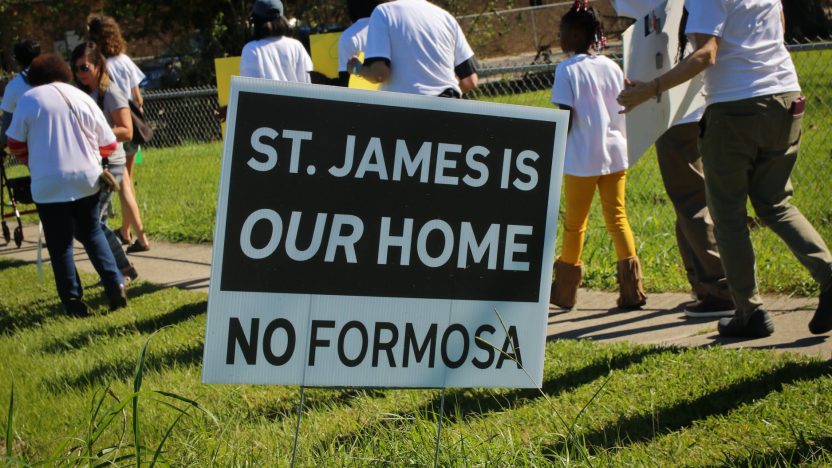
Petrochemical Industry Exploits Pandemic to Ease Rules
Groups Respond to Trump Administration’s Plan to Relax Public Health Protections for Oil Refineries and Other Industries
(Washington, DC)
The Louisiana Bucket Brigade will host a socially distanced Facebook Live update at 10 am CT via the organization’s Facebook page
Washington, D.C. – A coalition of environmentalists sent a letter to EPA objecting to a new Trump Administration policy, released on Thursday afternoon, that relaxes environmental compliance rules for petrochemical plants and other big polluters during the coronavirus crisis.
“It is not clear why refineries, chemical plants, and other facilities that continue to operate and keep their employees on the production line will no longer have the staff or time they need to comply with environmental laws,” said the statement, which was written by Eric Schaeffer of the Environmental Integrity Project, former Director of Civil Enforcement at EPA.
Co-signers of the letter included Luke Metzger, Executive Director, Environment Texas; Cynthia Giles, former EPA Assistant Administrator for Enforcement and Compliance Assurance; Anne Rolfes, Director, Louisiana Bucket Brigade; Mike Tidwell, Executive Director Chesapeake Climate Action Network; and a dozen others (see below).
The environmental organizations voiced their concerns in response to an announcement today that the Trump Administration EPA will “provide enforcement discretion under the current, extraordinary conditions.”
“Excusing the potential release of excess toxic air pollutants and other pollution that exacerbates asthma, breathing difficulty, and cardiovascular problems in the midst of a pandemic that can cause respiratory failure is irresponsible from a public health perspective,” the letter states.
The Environmental Integrity Project released a report last year documenting the sharp drop in environmental enforcement during the Trump Administration.
The full text of the letter from the organizations is below:
………………..
Susan Bodine, EPA Assistant Administrator for Enforcement and Compliance Assurance:
Dear Assistant Administrator Bodine:
We write to oppose EPA’s apparent plan to waive certain environmental compliance requirements for petrochemical plants and other polluting industries in response to the coronavirus. While it may be reasonable in limited circumstances for EPA to exercise discretion on a case-by-case basis to temporarily refrain from enforcement where the pandemic has clearly undermined a facility’s ability to comply, we oppose any blanket or advance waiver of environmental requirements for several reasons.
It is not clear why refineries, chemical plants, and other facilities that continue to operate and keep their employees on the production line will no longer have the staff or time they need to comply with environmental laws. Again, EPA can grant waivers where sources can show how the coronavirus makes compliance with certain requirements impossible. But what is the basis for presuming that the pandemic means companies can no longer comply with environmental rules while they continue to operate and process all other forms of corporate “paperwork,” e.g., applications for permits to expand, detailed comments to support the rollback of various environmental rules, and contracts for the sale or purchase of goods and services?
Contrary to assertions by the American Petroleum Industry (API) and other interest groups, the suspension of monitoring and reporting requirements would have a very specific impact on public health and safety in many cases. Allowing a company to postpone the repair of equipment that leaks toxic gases into the atmosphere, as API has suggested, leaves the public exposed to those pollutants for longer periods of time, increases the risk of fire and explosion, and is not just a paperwork concern. For another example, Clean Air Act rules limiting hazardous air pollution require refineries to monitor benzene levels at their fencelines, and to take corrective action whenever annual concentrations of this deadly pollutant exceed 9 micrograms per cubic meter.
Monitoring reports reveal that at least 10 refineries in Illinois, Louisiana, Mississippi, Pennsylvania, New Mexico and Texas exceeded this annual threshold in the fourth quarter of 2019. Pasadena Refining Systems in Texas reported that benzene levels along part of their boundary averaged 565 micrograms per cubic meter between October 16 and October 30 of 2019, or nearly six times the ten-hour exposure limit recommended by the National Institute of Occupational Safety and Health. Take away this monitoring, and you will leave both plant workers and communities blind to these hazards, and forestall the corrective action required when benzene levels get too high. Actions that obscure the release toxins or other air pollutants that exacerbate asthma, breathing difficulty, and cardiovascular problems in the midst of a pandemic that can cause respiratory failure is irresponsible from a public health perspective.
The Environmental Protection Agency has not shown the same concern for the impact the coronavirus has had on the ability of community and public interest groups to respond to various proposals to weaken environmental standards. In fact, EPA recently denied a request to extend the comment period for the so-called “science transparency” rule, at a time when public health officials who may oppose that decision have had to turn their attention to coronavirus. Our organizations face the same challenges keeping up with the rulemaking process as do large corporations, but with fewer resources. As pointed out by Mustafa Santiago Ali, EPA’s former Associate Administrator for Environmental Justice, communities already hardest hit by air pollution and particularly vulnerable to the virus may have no meaningful opportunity to comment during the current pandemic.
We understand the coronavirus is a public health emergency that may require a flexible response from EPA. That response must be tailored to specific and appropriate circumstances and not offer a blanket waiver of requirements that many companies that are up and running may have no trouble meeting.
We ask that EPA post online any agreements with regulated sources to delay or reduce environmental requirements, with a clear explanation of how the coronavirus pandemic made such decisions necessary and what steps facilities will take to reduce their health impacts. This would include the public posting of any “no action assurances” EPA issues for industries, along with an explanation of how the action is consistent with EPA’s written policy against no action assurances.
In all cases, EPA should provide a clear explanation of how the coronavirus pandemic made such agreements or no action assurances necessary. EPA should also provide notice and a meaningful opportunity to comment on any proposed changes to consent decrees, and ensure that states authorized to implement federal environmental rules do not inappropriately waive those requirements and are equally transparent about their decisions.
Thank you for considering our views.
Eric Schaeffer, Executive Director, Environmental Integrity Project
Mary Greene, Deputy Director, Environmental Integrity Project
Luke Metzger, Executive Director, Environment Texas
Mike Tidwell, Executive Director, Chesapeake Climate Action Network
Cynthia Giles, former EPA Assistant Administrator for Enforcement and Compliance Assurance
Jonny Vasic, Executive Director, Utah Physicians for a Healthy Environment
Dr. Elena Craft, Toxicologist and Senior Director for Climate and Health, Environmental Defense Fund
Phillip Musegaas, Vice President of Programs and Litigation, Potomac Riverkeeper Network
Adrian Shelley, Texas Office Director, Public Citizen
David Masur, Executive Director, PennEnvironment
Anne Rolfes, Director, Louisiana Bucket Brigade
Rebecca Sobel, Senior Climate and Energy Campaigner, Wild Earth Guardians
Dr. Indra Frank, Environmental Health & Water Policy Director, Hoosier Environmental Council
Katyln Schmidt, Waterkeepers Chesapeake
Terry Spence, Socially Responsible Agricultural Project
###
CONTACT:
Tom Pelton, Environmental Integrity Project, (443) 510-2574
Anne Rolfes, Louisiana Bucket Brigade, (504) 452 – 4909
